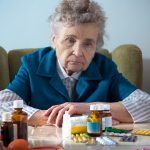Avoiding Overmedication in Long Term Care
Older adults are more likely to develop long-term (chronic) health conditions that require treatment with multiple medications. Many older adults also take non-prescription (OTC) medications, vitamins, and/or supplements. These factors along with age increase the risk for overmedication and unwanted drug reactions (adverse drug events or ADEs), making awareness crucial for avoiding overmedication in long term care. According to the Center for Disease Control (CDC), ADEs result in over 700,000 emergency room visits each year and many of these ADEs are predictable and preventable.
To lower the risk for ADEs, the American Geriatrics Society Foundation Health in Aging recommends the following tips for safe use of medications in older adults.
- Ask before taking any OTC drug. Duplicate therapy or taking two drugs with similar effects can result in toxic overdose. This may include an OTC drug with a similar prescription drug or two OTC drugs. The antihistamine, diphenhydramine is a good example. This drug is found in products labeled as antihistamines such as Benadryl and Alka-Seltzer Plus Allergy, but is also used in many sleeping pills and pain pills such as Sominex, Nytol, and Tylenol PM. Diphenhydramine should be avoided by most older adults as even in normal doses it can cause oversedation, dry mouth and eyes, constipation, confusion, retention of urine, and an increased risk of falls especially when combined with other drugs with sedative properties including alcohol.
- Make a List. Make a list of all the drugs you take including doses and how often you take them. Be sure to include any OTC drugs, vitamins, supplements, and herbal products. Share this list with all of your health care providers and keep it updated.
- Ask Questions. Make sure you understand the purpose and how to take any new medication. Ask your provider or pharmacist to check for any drug interactions and how you should monitor for effectiveness and side effects.
- Follow directions. Take all medications including OTC drugs only as directed. Even non-prescription drugs can have serious side effects if taken too often or in too high a dose.
- Report problems. If you begin to have a new health problem after starting a new medication contact your health care provider immediately. Always remember that any new medical symptom in an older adult should be considered an adverse drug event until proven otherwise. Never take a second drug to treat new symptoms until you have discussed the new symptom with your health care provider.
- Medication Dos and Don’ts
- Do throw away any medication if the expiation dare has passed. Ask your pharmacist about proper disposal for unwanted medications
- Do make a list of your medications and know what each is for
- Do ask questions
- Do refill your prescription in a timely manner to avoid running out. Failure to take medication as prescribed is the number one medication error leading to hospitalization
- Don’t stop taking medication just because you feel better. This is especially important for drugs used to treat infection.
Source: American Geriatrics Society Foundation healthinaging.org




